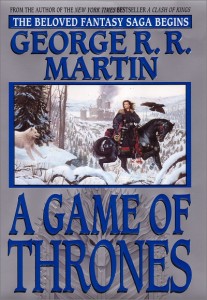I think that I was a little hard on The Shadow Rising in my mind, when I claimed that The Dragon Reborn was the last book in the series that had a solid structure to bring everyone into the same storyline. I mean, yes, some of the characters have fully divergent stories for the first time, and they will remain diverged until the end of the series from here on out. I mean, some people reconverge at certain times, but never everyone all together. (P.S. Still spoilers, for now. Probably not much longer, I’ll be more careful, but they still exist for now.)
But the plotlines in this book constantly mirrored each other thematically in ways that I would be able to describe rather than assert if I had not waited so very long after the book for the review. (This is a real problem that I will try to avoid in the future. Because, pretty embarrassing, right? I mean, even one “for instance” and I’d be satisfied. But my brain is a blank slate on the point, other than having been impressed by it as I was reading. This is one of the upsides of re-reading a book when you know all the things that are going to happen in it. You can get a lot more deeply into the structure of the thing, the themes, the foreshadowing, develop a real appreciation for the craft of writing. When craft exists, at least, which it did here, despite my lack of proof.)
Plus also, some of the coolest scenes in the series, right? Well, at least, the highest concentration of them. Redstone doorframes? Rhuidean? I’m just saying, cool shit went down. Plus… so, this was the first of these books that I read any of. I was at UT for a weekend “come be at our school” trip, in the summer of 1992, and my occasional girlfriend was reading it, and I glanced at what she was reading, a scene where Mat was trying to convince Perrin that they should both ditch Rand, because, crazy channeler guy even if he is the Dragon, right? She explained to me that Mat was less of a dick than he sounded in that scene, and I eventually picked them up based on the recommendation. (Later, I realized that when she sent me through a three-ringed art installment on the UNT campus hoping I’d have some kind of vision, that was a reference too.) My point is, it will always be special to me not just because I haven’t entirely gotten over the collapse of the Age of Legends and the Da’shain Aiel, but also because it marks the first words I read in the Wheel of Time.
Anyway, good book. But then, haven’t they all been, so far?
